RAY SUAREZ:For more on all of this, we are joined by Joel Charny, vice president for humanitarian policy and practice at InterAction, an alliance of U.S.-based relief and development organizations.
And, Joel, let's stipulate from the get-go that anybody who continues to give out doses after these killings is just tremendously brave.
JOEL CHARNY, Humanitarian Policy and Practice, InterAction: Exactly.
RAY SUAREZ:But does this have the potential for curtailing or stopping a program that had a disease on the run?

JOEL CHARNY:Well, I think absolutely.
I mean, the—you heard that eloquent woman leader basically saying, we're risking our lives for this. This is something that's for the future of our children.
But at some point, they will be unable to continue if the violence and the violent threats force them to -- both them and the health organizations that are working on this to curtail the programs.
RAY SUAREZ:The vaccination program in Pakistan already was under suspicion by the Taliban. But did the United States complicate things in Pakistan, and how?
JOEL CHARNY:We didn't help, because I think, as many Americans know, as part of the operation to identify Osama bin Laden's whereabouts, the CIA put together what you would have to call a bogus vaccination campaign to try and identify bin Laden's whereabouts.
This became widely known. The doctor who was a part of it ended up being sentenced to 30 years in jail. But there you have the manipulation of a pure humanitarian program for political and counterterror ends. And this was very controversial across all of Pakistani society, but especially strikes at the militants in a sense, well, here is another example of how these sort of Western programs are striking at our interests. And it undermines the credibility of what should be a basic health intervention.
RAY SUAREZ:And complicated the plea from any subsequent NGO that they're neutral, that they're not affiliated with a government?
JOEL CHARNY:Well, exactly.
Anything, any attempt to make that case, there's going to be a bit of suspicion on the part at least of the militant groups. I think there's a commitment from the Pakistani government to make these programs work up to the highest level. But in these deep rural areas where people are so far away from the center, and there's such a low level of education and so on, the ability—I mean, we handed a propaganda tool to groups that want to undermine these programs.
RAY SUAREZ:Apart from this, looking across the world, where these programs are going on, are attacks against aid workers rising? Is this work getting more dangerous to do?
JOEL CHARNY:It is.
There's a new report out just this week saying, in 2011, security incidents, both killing and wounded, amounted to 305 in 2011. Now, that doesn't sound like a huge number, but I have been in this work long enough to remember when that number would have been less than 20 or less than 10.
There's an erosion of our ability as a humanitarian community to work safely. And we have to examine -- we can't hunker down and end the work, but we have to find ways to continue to be effective, but in the safest way that we possibly can.
RAY SUAREZ:In the safest way you can.
If you lay on more security, does that make it more difficult to be with the people you're trying to help?
JOEL CHARNY:Well, yes. And the whole point of what we try to do precisely is to be with the people, both for kind of solidarity and empathy, but also to be more effective, so that we can see the impact, so that we can be side by side with people.
And, you know, the jargon term now is bunkerization. We don't want to be behind a bunker. If we're behind a bunker, we're not effective. But at the same time, at what point do you ask people to die for the sake of a program or risk their lives for a program?
And the analysis now is, basically, if you're doing something that's lifesaving, it's worth taking more of a risk than if you're doing an ongoing program that may be able to manage itself or wouldn't hurt people so much if it were suspended.
But, I mean, this whole idea of how fundamentally important is this program to the lives of people is a question that we have to ask ourselves.
RAY SUAREZ:The state-of-the-art, I'm told by many in this community, is to use locals as much as possible. They are able to approach the people who they live among more easily. Yet, they may also understand the risks and be more reluctant to be parts of these programs, too.
JOEL CHARNY:Well, they are more—they are more vulnerable.
I mean, when I give that figure of 305 casualties in 2011, the majority of those were among local staff, local people, local workers. So, it's, in fact, not a solution to say, well, we're going to have the expatriates out in some safe place and we're going to have the local people taking the risk.
They're willing to take the risk, just as we may be, but they're equally subject. In other words, the fact that they're from the community doesn't necessarily make them safer.
RAY SUAREZ:Does this send a chill, this incident in Pakistan, through a much wider set of relationships?
JOEL CHARNY:I think so, absolutely.
And it just—there's just a—it is just fundamentally wrong to see a 17-year-old woman or a 20-year-old woman or a 30-year-old woman be killed for vaccinating a child. I mean, I find that very chilling. And it's not that, OK, so now we're going to just hang it up everywhere, but the idea that this can happen in a country like Pakistan is very disturbing.
RAY SUAREZ:Joel Charny, thanks for joining us.
JOEL CHARNY:Thank you.











